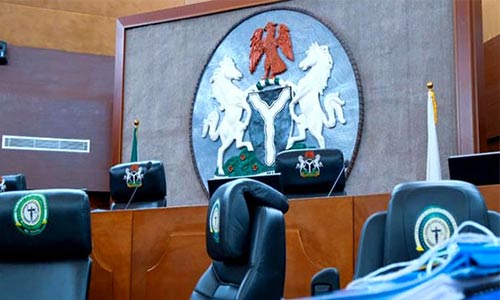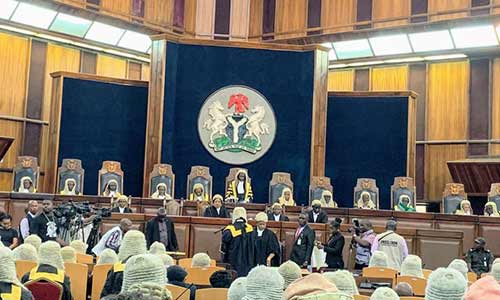SUPREME COURT JUDGEMENTS 04/10/2022
Entitlement Of An Employee On The Wrongful Termination Of His Employment

In the Supreme Court of Nigeria
Holden at Abuja
On Friday, the 10th day of June, 2022
Before Their Lordships
Kudirat Motonmori Olatokunbo Kekere-Ekun
John Inyang Okoro
Abdu Aboki
Ibrahim Mohammed Musa Saulawa
Tijjani Abubakar
Justices, Supreme Court
SC./79/2009
Between
Charles Olusola Toyinbo Appellant
And
Union Bank Plc Respondent
(Lead Judgement delivered by Honourable Ibrahim Mohammed Musa Saulawa, JSC)
Facts
The Appellant was a former staff of the Respondent, prior to the termination of his appointment vide a letter dated 8th January, 2001. Consequent upon the termination of his appointment, the Appellant commenced a suit at the High Court of Ekiti State against the Respondent, claiming inter alia, a declaration that the termination of his appointment is illegal, unconstitutional, null and void and of no effect whatsoever.
The trial court gave judgement in favour of the Appellant. The Respondent was dissatisfied, and thus, appealed against the said judgement of the trial court. The appeal was successful. The appellate court overturned the decision of the trial court. The Appellant then appealed to the Supreme Court.
At the Supreme Court, the Respondent raised a Preliminary Objection challenging the competence of the appeal on ground that the Appellant’s originating processes at the trial court were incompetent, having been issued and signed by a law firm and not a legal practitioner known to law, in line with Section 2(1) and 24 of the Legal Practitioners’ Act.
Issues for Determination
The following four issues were considered by the court for determination of the appeal:
- Whether the Court of Appeal was right to have held that the appointment of the Appellant was validly terminated because he cancelled his signature of an internal voucher of the Respondent, which cancellation amounts to misconduct and disobedience to the instruction of a superior, when there was no appeal against or argument canvassed by any of the parties on the issue before the Court of Appeal.
- Whether the Court of Appeal was right to hold that the alleged payment and receipt of a month’s salary in lieu of notice as provided for under Exhibit D (Conditions of Service), amounted to a valid termination of the Appellant’s appointment.
- Whether the Court of Appeal was right when it overruled the Appellant’s Preliminary Objection on failure of the Respondent to seek leave of the Court of Appeal to argue issue B2 covering Ground 5 of the Respondent’s Appeal before the Court of Appeal.
- Whether the Court of Appeal was right when it set aside the award of damages made by the trial court in favour of the Appellant.
Arguments
On issue one, counsel for the Appellant argued that the Court of Appeal was in error when it suo motu, considered the issue of cancellation of the Appellant’s signature on the internal voucher of the Respondent, when there was no Ground of Appeal against the findings of fact on the issue. He argued that the matter which had been treated administratively and the Appellant absolved by the Respondent, seriously prejudiced the Appellant’s case, and occasioned a miscarriage of justice thereby. Reacting to the submission, counsel for the Respondent argued that the issue is clearly a misinterpretation of the findings of the court below. He argued that the appellate court did not base its decision on the appointment of the Appellant being validly terminated, because he cancelled his signature on an internal voucher of the Respondent. The Appellant’s conduct rendered the determination of his employment with the Respondent, mutual.
Arguing issue two, counsel submitted on behalf of the Appellant that his case is based on Exhibit D – the condition of service between the Appellant and Respondent. That based on Exhibit D, a valid termination is a condition precedent to payment of a month’s salary in lieu of notice for a validly terminated employment. The court below having agreed that Exhibit D was the binding condition of service between the parties, was under an obligation to give maximum effect to the provisions of Exhibit D. He posited that the termination of the Appellant’s employment was not in compliance with Exhibit D, and therefore wrongful. Responding, counsel for the Respondent argued that the court below was on firm ground when it held that, the alleged payment of a month’s salary in lieu of notice was proved and accepted by the trial court and relied upon by the court below. Counsel argued that there was no cross appeal on the finding of the trial court, which the court below rightly relied upon.
On issue three, the Appellant argued to the effect that the Respondents’ issue B2 covering Ground 5 of its Grounds of Appeal at the court below, is incompetent, as the trial court did not make any pronouncement on the issue of payment in lieu of notice. He argued that a ground of appeal must flow directly from the judgement complained against; thus, the Court of Appeal was in error when it dismissed the Appellant’s Preliminary Objection on the issue and allowed the Respondent to argue Ground 5 of its appeal without leave of court. Counsel for the Respondent argued per contra, submitting that the court below was in order when it overruled the Appellant’s Preliminary Objection on the Appellant’s failure to seek leave to argue issue B2 covering Ground 5 of the Respondent’s Appeal. He submitted that, in showing the termination of the Appellant’s appointment was not illegal, unconstitutional, null and void, the Respondent was entitled to rely on a new line of argument.
Submitting on issue four, it was argued for the Appellant that the award of special and general damages by the trial court did not amount to a double compensation. That the Appellant made a case for both, and his evidence on both was not contradicted, challenged, controverted, or debunked. Responding, counsel for the Respondent argued that the court below was not in error, when it set aside the award of damages by the trial court. He argued further that where an employee successfully established wrongful termination of his employment, he would only be entitled to what would have been due to him for the period of notice.
Court’s Judgement and Rationale
The Supreme Court considered first, the Preliminary Objection of the Respondent to the competence of originating processes filed by the Appellant at the trial court, on the authority of OKAFOR v NWEKE. The court noted that the Respondent who did not file a Cross-Appeal, did not also deem it fit to give the court and the Appellant notice of the Preliminary Objection which was argued in its Brief of Argument. Determining the objection, their Lordships, held that it is obvious on the record that the originating processes were filed at the trial court pursuant to the provisions of Order 2, Rule 6 of the High Court of Ondo State Rules, 1978 (applicable to Ekiti State). By the said law, the Appellant’s solicitor was allowed to either personally endorse the processes in his own name or the name of his law firm. That was the applicable rule prior to the enactment of the Uniform High Court Rules and the Legal Practitioners Act 2007, pursuant to which laws the decision in the case of OKAFOR v NWEKE, cited by the Respondent, was determined. The authorities are to the effect that enactments regulating practice and procedure of courts are usually constructed as imperative – OJUKWU v YAR’ADUA (2009) All FWLR (Pt. 482) 1065. The court, therefore, agreed with the Appellant that the instant case is quite distinguishable from OKAFOR v NWEKE. The Preliminary Objection was adjudged to be unmeritorious, and it was accordingly dismissed.
Deciding issue one, the Supreme Court held that contrary to the Appellant’s misconceived submission, the Court of Appeal did not predicate its decision on the Appellant’s appointment being validly “terminated” because he cancelled his signature on an internal voucher of the Respondent. Rather, the Court of Appeal was satisfied that by virtue of Exhibit A, the Appellant was duly given a letter of Termination of Employment. Also, by virtue of Exhibit O, it is evident on the face of the record, that the Appellant had indeed, been paid his terminal benefits and the action leading to this appeal was filed after two years and ten months of payment of the Appellant’s terminal benefits. The court cited the decision of MOROHUNFOLA v KWARA STATE COLLEGE OF TECHNOLOGY (1990) 4 NWLR (Pt. 145) 506, where it was decided that if the Appellant therein had rejected the payment of salary in lieu of notice, then the unilateral repudiation of his contract of service would not have operated to determine the contract.
On issue two, the court held that the Appellant’s case is based on Exhibit D. It was the finding of the court below that Exhibit D is the contractual document that binds the parties, particularly where there is no other agreement. It was the ultimate finding of the court below that, since Exhibit D incorporates the procedure for determination of the contract, which in this case, is by service on the Appellant of a month’s notice or payment of salary in lieu of notice, all that the Respondent needed to do was to serve the Appellant with the requisite notice or pay the salary and terminal benefits – HARRY SHULMAN: REASON, CONTRACT, AND LAW IN LABOUR RELATIONS, 68 HARVARD REVIEW (1995) 999. Given the above, the decision of the court below is cogent, unassailable, and duly supported by the pleadings, evidence, and trite authorities relevant thereto on the record.
Regarding issue three, the Supreme Court held that the finding of the Court of Appeal on the issue is undoubtedly cogent and unassailable and as aptly posited by the Respondent, having established that the termination of the Appellant’s appointment was not illegal, unconstitutional, null and void, the Respondent was entitled to rely on a new line of argument – CEDAR STATIONARIES LTD v IBWA LTD (2000) 15 NWLR (Pt. 690) 338.
On issue four, the Apex Court held that the law is well settled, beyond per adventure, that where an employee successfully establishes a wrongful termination of his employment, he should be entitled to the payment of what ought to have been due thereto for the period of the notice – COOPERATIVE DEVELOPMENT BANK v ESSIEN (2001) 4 NWLR (Pt. 704) 479. In the instant case, it was the finding of the court below that the trial court awarded damages to the Appellant upon the assumption that the Appellant’s appointment was wrongfully terminated. And that, if at all that was the case, the damages should not have exceeded his salary and perquisites of office as at the time notice was not given to him. In other words, the principle “of restitution integrum would have applied on the computation. The court held that in view of the pleadings and evidence of the respective parties on record, the foregoing findings of the court below are cogent and unassailable.
Appeal Dismissed.
Representation
Ayodeji Olurotimi Odu for the Appellant.
Kolawole Esan for the Respondent.



